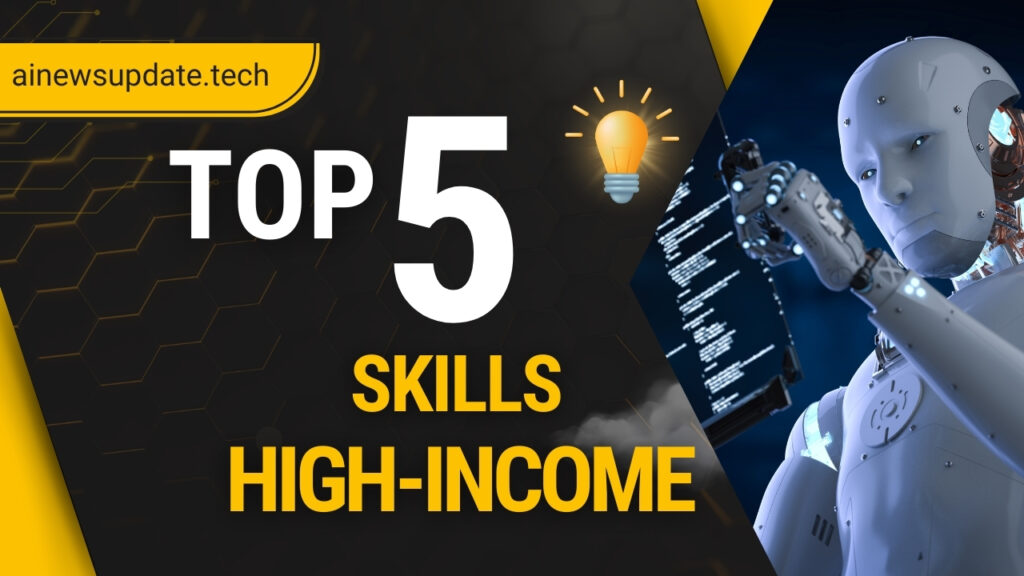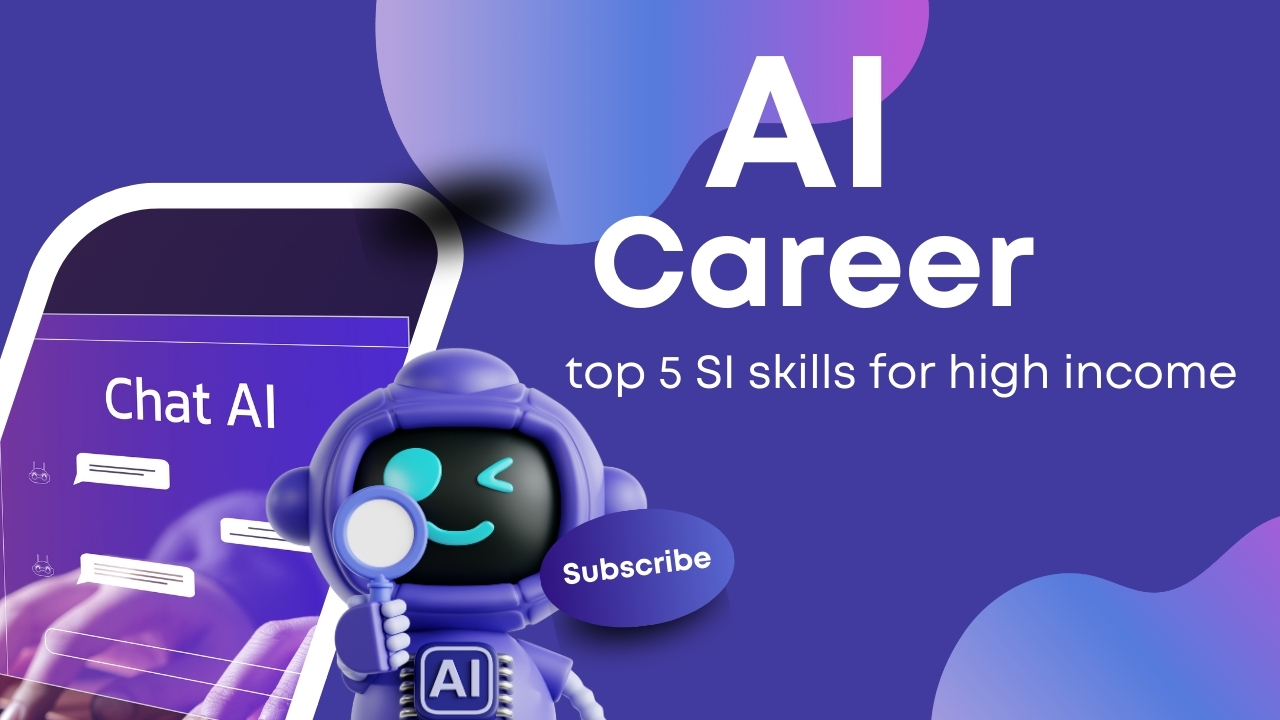Artificial Intelligence (AI) is reshaping industries and creating unprecedented opportunities for skilled professionals. As we head into 2025, mastering high-income AI skills can lead to lucrative careers with salaries ranging from $120,000 to $300,000 annually. Whether you’re a beginner or an experienced professional, focusing on the right AI skills can position you at the forefront of this booming industry. In this comprehensive guide, we’ll explore the top 5 high-income AI skills to master in 2025, why they’re in demand, and how you can start learning them today.
Why AI Skills Are High-Income in 2025
The AI industry is expected to contribute $15.7 trillion to the global economy by 2030, according to PwC’s Global AI Study. Companies in healthcare, finance, technology, and retail are investing heavily in AI, driving demand for specialized talent. AI professionals are among the highest-paid in the tech industry due to the complexity and impact of their work. By acquiring in-demand AI skills, you can secure roles like machine learning engineer, NLP specialist, or AI ethicist, all of which offer exceptional earning potential.
Top 5 High-Income AI Skills to Learn in 2025

Here are the five AI skills that are not only in high demand but also command premium salaries in 2025.
1. Machine Learning (ML) Engineering
Machine learning is the cornerstone of AI, enabling systems to learn from data and make predictions. ML engineers design and deploy algorithms that power applications like recommendation systems, autonomous vehicles, and fraud detection.
Why It’s High-Income
- Demand: Tech giants like Google, Amazon, and Tesla rely on ML for innovation.
- Salary: ML engineers earn $150,000–$250,000 annually, depending on experience.
- Versatility: ML is used in industries like finance, healthcare, and e-commerce.
How to Learn Start with Python, the primary programming language for ML. Learn libraries like TensorFlow, PyTorch, and Scikit-learn. Online platforms like Coursera, edX, and Udemy offer beginner-to-advanced ML courses. Practice by building projects such as image classifiers, stock price predictors, or recommendation systems. Contribute to open-source ML projects on GitHub to build a portfolio that showcases your skills to employers.
Pro Tip: Earn certifications like Google’s Professional Machine Learning Engineer to boost your credibility.
2. Natural Language Processing (NLP)
Natural Language Processing enables machines to understand and generate human language. NLP powers chatbots, virtual assistants like Siri, and language translation tools, making it a critical skill in 2025.
Why It’s High-Income
- Growing Applications: NLP is essential for customer service automation, sentiment analysis, and content generation.
- Salary: NLP specialists earn $130,000–$220,000 per year.
- Innovation: Advances in large language models (LLMs) like GPT-4 fuel demand.
How to Learn Master Python and NLP libraries like NLTK, SpaCy, and Hugging Face’s Transformers. Study deep learning concepts such as recurrent neural networks (RNNs) and transformers. Enroll in specialized NLP courses on platforms like Stanford Online or DeepLearning.AI. Build hands-on projects like sentiment analyzers, chatbots, or text summarizers to gain practical experience.
Pro Tip: Stay updated on LLM advancements by following AI research blogs like Hugging Face and ArXiv.
3. Computer Vision
Computer vision enables machines to interpret visual data, powering applications like facial recognition, medical imaging, and autonomous driving. It’s a rapidly growing field with immense potential.
Why It’s High-Income
- Industry Impact: Computer vision is critical in healthcare, automotive, and security.
- Salary: Computer vision engineers earn $140,000–$230,000 annually.
- Emerging Tech: AR/VR, drones, and smart cities rely on computer vision.
How to Learn Learn Python and frameworks like OpenCV, TensorFlow, and PyTorch. Understand convolutional neural networks (CNNs) and image processing techniques. Take courses like Udacity’s Computer Vision Nanodegree or Stanford’s CS231n. Build projects like object detection systems, image segmentation models, or facial recognition tools to demonstrate your expertise.
Pro Tip: Participate in Kaggle competitions to sharpen your computer vision skills and gain recognition.
4. AI Ethics and Responsible AI
As AI adoption grows, so does the need for ethical AI practices. AI ethicists ensure that AI systems are fair, transparent, and free from bias, addressing concerns like data privacy and algorithmic discrimination.
Why It’s High-Income
- Regulatory Demand: Governments and organizations are prioritizing ethical AI frameworks.
- Salary: AI ethicists earn $120,000–$200,000 per year.
- Social Impact: This skill addresses critical societal challenges.
How to Learn Study AI ethics through courses on platforms like Coursera or MIT OpenCourseWare. Understand topics like bias mitigation, explainable AI, and data privacy laws (e.g., GDPR). Gain knowledge of AI frameworks like TensorFlow Privacy. Engage in discussions on AI ethics through conferences or online forums like AI Ethics Lab. A background in philosophy, law, or social sciences can be an advantage.
Pro Tip: Follow organizations like the AI Now Institute for insights into responsible AI practices.
5. Reinforcement Learning (RL)
Reinforcement learning is an advanced AI technique where agents learn by interacting with environments, optimizing decision-making. RL is used in robotics, gaming, and resource management.
Why It’s High-Income
- Cutting-Edge: RL drives innovation in autonomous systems and AI research.
- Salary: RL specialists earn $150,000–$260,000 annually.
- Niche Expertise: Fewer professionals specialize in RL, increasing demand.
How to Learn Master Python and RL libraries like OpenAI Gym and Stable Baselines. Study foundational concepts like Markov decision processes and Q-learning. Take advanced courses like DeepMind’s RL course on YouTube or Udacity’s Deep Reinforcement Learning Nanodegree. Build projects like game-playing agents or robotic control systems to gain hands-on experience.
Pro Tip: Read RL research papers on ArXiv to stay ahead of emerging trends.
How to Start Your AI Career in 2025
To succeed in the AI industry, follow these steps:
- Build a Strong Foundation: Learn Python, mathematics (linear algebra, calculus, probability), and data science basics.
- Choose a Specialization: Focus on one or two of the above skills based on your interests and career goals.
- Enroll in Courses: Use platforms like Coursera, edX, Udacity, or DeepLearning.AI for structured learning.
- Work on Projects: Create a portfolio with projects like chatbots, image classifiers, or ethical AI frameworks.
- Network and Certify: Join AI communities on LinkedIn, attend conferences, and earn certifications to boost credibility.
- Stay Updated: Follow AI blogs, podcasts, and research papers to keep up with industry trends.
Why Now Is the Time to Learn AI Skills
The AI job market is growing at an unprecedented rate. According to the World Economic Forum, AI will create 97 million new jobs by 2025. Early adopters who master high-income AI skills now will have a competitive edge. Additionally, advancements in AI tools and frameworks make it easier than ever to learn and apply these skills.
Conclusion
Mastering high-income AI skills like machine learning, NLP, computer vision, AI ethics, and reinforcement learning can open doors to rewarding careers in 2025. These skills are in high demand, offer six-figure salaries, and allow you to work on cutting-edge technologies that shape the future. Start by learning Python, enrolling in online courses, and building a portfolio of projects. With dedication and the right resources, you can become an AI expert and secure a high-paying role in this dynamic industry.
Call to Action: Ready to start your AI journey? Enroll in a course today, join an AI community, or begin a project to showcase your skills. The future of AI is bright—make sure you’re a part of it!





One thought on “High-Income Top 5 AI Skills to Master in 2025”